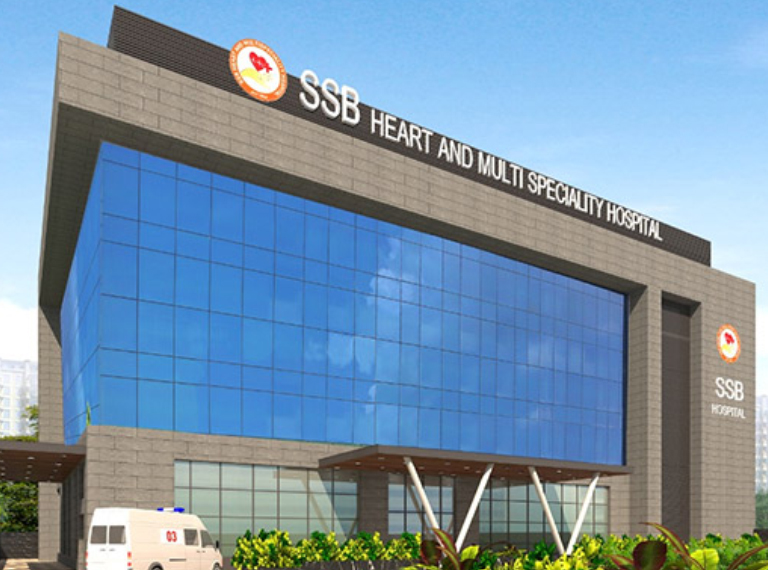Triple Valve Replacement or Repair
SSB Heart and Multispecialty Hospital, Haryana, India
-
Our Price USD 13605
-
Hospital Price USD 14321
-
You Save : USD 716
Booking Amount: USD 1360. Pay Remaining 90% at the hospital.
- Explore benefits & save additional 30%
Additional Credit
Among the important extras we offer as part of the Additional Credit are the following:
-
Site Tourism For The Patient & Attendant
-
Airport Pick & Drop Service
-
Ambulance service at airport
-
Priority appointments with The Doctor
-
Cancel Easily Anytime with Full Refund
-
Room Upgradation
-
Free Online Doctor Consultation Valued at USD 20
-
Free hotel Stay for 5 to 7 days Accordingly
-
Welcome Kit at Arrival
-
Interpreter
-
Medical Visa Assistance
What is Included?
- Doctor consultation charges
- Lab tests and diagnostic charges
- Room charges inside hospital during the procedure
- Surgeon Fee
- Cost of implant
- Nursing charges
- Hospital surgery suite charges
- Anesthesia charges
- Routine medicines and routine consumables (bandages, dressings etc.)
- Food and Beverages inside hospital stay for patient and one attendant.
What is not Included?
- Extra Radiology Investigations
- Healthcare Professionals Charges of other consultations.
- Other Requested Services such as Laundry etc.
- Additional Pharmaceutical Products and Medicines After Discharge from Hospital.
- Management of Conditions Unrelated to Procedures or Pre-Existing.
- The cost of any additional implants will be in addition to the package cost.
Package Description
Triple Valve Replacement or Repair
Numerous valve illnesses, such as rheumatic and degenerative valve disease, as well as endocarditis, can cause damage to multiple valves, necessitating double and triple valve surgery. Due to longer durations of cardiopulmonary bypass and aortic cross-clamp times, triple valve surgery (either replacement of the aortic, mitral, and tricuspid valves, or simultaneous replacement of the aortic and mitral valves with tricuspid valve repair) is still a difficulty for most surgeons. According to recent reports, the surgical mortality rate after triple valve surgery is around 13%. Furthermore, compared to single valve replacement, multiple valve replacement exposes patients to additional long-term prosthetic valve-related morbidities such as endocarditis, thrombosis, anticoagulation-related bleeding, and paravalvular leak. With recent improvements and evidence in favour of transcatheter valve replacements, including valve-in-valve surgeries, it has become a preferred option, especially for critically sick patients. TMViVR (transcatheter mitral valve-in-valve replacement) is also becoming a less invasive option for individuals with a failing bioprosthetic valve.
Disease Overview
Heart valve damage caused by rheumatic fever is known as rheumatic heart disease. Rheumatic fever is caused by group A streptococcal (GAS) infections, which induce the body's inflammatory reaction. An infection like strep throat or scarlet fever affects your immune response. It causes inflammation all across the body, including the heart. If left untreated, inflammation can result in irreversible heart valve damage as well as other major health issues. Rheumatic fever is more common in children and teens who have untreated strep infections. signs of cardiac damage may appear Years after the illness and fever have passed. Children in poor nations who do not have access to antibiotics are the most vulnerable. The illness has the potential to cause major health issues, such as heart failure. The most common treatments are medication and surgery.
Signs and Symptoms
Rheumatic heart disease symptoms might take years to show following a strep infection or rheumatic fever. People who have had their hearts damaged may suffer the following symptoms:
- Chest pain.
- Heart murmur.
- Fatigue.
- Swelling in the stomach, hands or feet.
- Shortness of breath.
Information related to Treatment
Package Details
Days in Hospital
6 Days
Days in Hotel
*
14 Days
Room Type
Private


